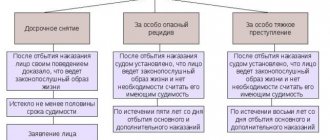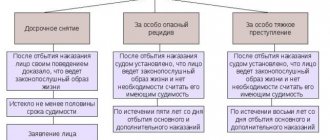Having a criminal record is a serious obstacle to a prosperous life. Because a person is haunted by restrictions even after he has served his sentence. Therefore, many convicts want to remove their criminal records from the database, however, this will only be possible in rare cases. Let's consider situations when you can remove an unwanted entry about a person's past.
Basic information
If a person has been charged with a crime and faces criminal liability, he receives a special legal status in the form of a criminal record.
A criminal record begins after serving a sentence and leads to many unpleasant consequences for a person:
- access to a career in government agencies and child care institutions is forever closed, you cannot stand as a candidate for deputy;
- an outstanding criminal record can lead to a ban on being in public places at night, visiting places of public recreation (sometimes administrative supervision by police officers is established indefinitely);
- having a criminal record does not allow the possibility of obtaining a hunting license or owning a weapon;
- A criminal record deprives you of the opportunity to adopt a child.
If the criminal record is still ongoing, but the person has committed another intentional crime, then the final punishment is increased, since recidivism is an aggravating factor.
Relapse
The fact of conviction has certain consequences that affect a person’s life for a certain time after serving the sentence. This period is associated with the concept of “convicted” . While a person is considered to have a criminal record after a period of imprisonment or community service, he will not be hired (in the case where special requirements are imposed on the applicant for the position).
Also, during the period of a criminal record, it is especially dangerous to commit a repeated offense or crime, because this event will already be considered a recidivism . The consequences of a criminal record include registration in the Information Center of the Internal Affairs Directorate, in the State Information Center of the Ministry of Internal Affairs of the Russian Federation.
These centers have information about the date of release of the defendant; it is from this day that the criminal record is expunged. Even if the expungement of a criminal record occurred many years ago, the problem with employment remains.
ATTENTION! In such structures as the FSB, the prosecutor's office, and the police, a person with a previous conviction cannot get a job even after the deadline given to expunge the criminal record.
It should also be taken into account that for the entire period of expungement of a criminal record, surveillance of the convicted person by law enforcement agencies is observed . If there are facts of violations during the criminal record, under Article 314 of the Criminal Code of the Russian Federation, a criminal case begins to be considered under the article for evading supervision.
The punishment, as determined by state law, in this case will be more severe, and the probationary period will be immediately canceled. If the defendant managed to commit another crime, the term for it is added to the previous one . And there will now be no talk of canceling a criminal record early.
How long does a criminal record last?
Art. 86 of the Criminal Code of the Russian Federation establishes time periods after which a person’s criminal record is removed.
- In case of a fine, correctional or compulsory labor, the duration of a criminal record is 1 year from the date of execution of the punishment. The exception is imprisonment.
- If a person has committed a crime of minor or moderate gravity, then after leaving prison 3 years must pass for the criminal record to be expunged. Minor crime - threat to kill, causing grievous harm to health, beatings, petty theft (punishment - up to 2 years in prison). A crime of moderate gravity - arbitrariness with violence, secret theft causing serious damage, possession of a small amount of drugs (punishment - up to 5 years in prison).
- If a person has committed a serious crime, then the criminal record is 8 years. Serious crime - possession of a large amount of drugs, rape, fraud, illegal possession of weapons, serious thefts, organizing fraudulent activities, beating with terrible consequences for the victim. Punishment is imprisonment for up to 10 years.
- If a person has committed a particularly serious crime, then the criminal record is 10 years. A particularly serious crime is murder, causing serious bodily harm due to which the victim died, large-scale drug sales, robbery, large bribes. Punishment: 10 years in prison.
Attention! If a person was convicted, but no punishment was imposed for some reason (for example, due to a dangerous illness of the accused), then he does not have a criminal record.
When placing a suspended sentence, it is necessary to take into account the length of the probationary period. After this period has passed, the criminal record is automatically removed.
Possibility of expunging a criminal record
- More often, a positive result awaits an application for a suspended conviction. According to the law, a conditional conviction is given for minor, less criminal crimes. At the same time, those who serve sentences in prison do not always achieve what they want.
- It is especially rare for those who have committed violence, engaged in corruption, or are imprisoned for murder to have their convictions removed early.
In order to have grounds to write an application to the court, you need to be of good behavior and work in a permanent place . A positive reference from the place of residence and work is also important.
It is necessary for the convicted person to visit the precinct or other law enforcement representative exercising control as scheduled. If the court has imposed certain obligations on the convicted person, for example, payment of compensation to the victim of a crime, they must be fulfilled.
How to expunge a criminal record early
It is necessary to submit a petition for early expungement of a criminal record to the judicial authority at the address of your residence - to a district or magistrate court, depending on the verdict. The application contains the following information:
- name and address of the court;
- information about the applicant – full name, date of birth, address, sentence, date of release;
- a request to expunge the applicant’s criminal record for such and such reasons (regret about what happened, the need for early expungement of the criminal record - for example, the presence of dependents and the inability to get a normal job);
- indication of positive characteristics, lack of prosecution under specific articles;
- list of attached documents;
- date of sending the application to the court, signature of the person applying.
You also need to attach documents and certificates to the application, which, among other things, confirm the fact of ideal behavior in society:
- photocopy of the sentence, certificate of completion of the sentence;
- certificate of family composition, birth certificates of children;
- characteristics - from the manager, neighbors, local police officer at the place of residence.
In case of a suspended sentence, it is necessary to send a petition to the criminal-executive inspection where the person is registered. The employees of the institution themselves will appeal to the judicial authority with a representation.
In order to increase the chances of a positive court decision, it is necessary to compensate the victim and other persons involved in the case, if possible.
The court's decision
Consideration of the issue of parole or a court hearing on early removal of a criminal record can have different results. If the court has decided to expunge your criminal record, you will need to obtain a certificate from the ATC Information Center stating that the criminal record has been expunged . What to do if the result is negative?
IMPORTANT! The defendant may file the petition again, but not earlier than after a year.
The court decision is not satisfactory. There is a procedure for filing an appeal, which must be filed within 10 days after service of the court order on the petition. The appeal is filed to a higher court.
Further actions
If the court meets the applicant halfway, it will issue an act of satisfaction of the requirements in the petition.
After this, the person needs to go to the regional office of the Information Center of the Ministry of Internal Affairs. You can also use the government services website. The Center will issue the applicant with a certificate confirming the expungement of his criminal record.
If the court refuses the applicant, then a second petition may be sent only after 1 year.
If the applicant disagrees with the negative court decision, he has the right to appeal. The period for appeal is 10 days from the date of receipt of a photocopy of the court decision.
What other methods are there?
Not only the court can decide to expunge or remove a criminal record. An amnesty or act of pardon also has this right; this is determined by Articles 84 and 85 of the Criminal Code of the Russian Federation.
- Amnesty decisions are issued by the State Duma . Only those criminals whose articles provide for the possibility of expunging a criminal record can be eligible for amnesty.
- Pardon is the right of the President of the Russian Federation . He single-handedly draws up a decree on certain convicts.
To achieve a pardon, you also need to draw up a petition based on the sample, collect the necessary papers and documents. It is important to prove that the convicted person has reformed, repented of his actions and no longer intends to break the law.
Download a sample petition for pardon
Concepts
Within the framework of the law, a criminal record is the legal status of a person who has been subjected to criminal punishment due to the commission of a specific crime.
Moreover, a person is considered to have been convicted regardless of the type of punishment applied, which, by virtue of Article 44 of the Criminal Code of the Russian Federation, can be expressed in both imprisonment and fines, and in some cases, a ban on holding a certain position for a period of one to five years.
Moreover, under Article 86 of the Criminal Code of the Russian Federation, a person is convicted from the date the conviction comes into force and until the full serving of the sentence. Of course, if circumstances did not arise that made it possible to remove the criminal record early due to the same exemplary behavior or an amnesty based on a court decision in the manner prescribed by law, namely Article 400 of the Code of Criminal Procedure of the Russian Federation.
Deadlines for filing an application
There is no rule in Russian legislation that would clearly regulate when exactly a person receives the right to apply to initiate a DSS. Theoretically, this can be done at any time convenient for the interested party. However, in practice everything is a little more complicated.
Firstly, delays may arise due to the need to prove impeccable behavior from the point of view of the legislator. It will take at least one month to establish yourself positively. Sometimes finding a job or undergoing treatment for alcohol addiction takes several years. Secondly, it is required to pay for the material and moral damage caused during the crime. This requires money, which is not always available to the convicted person.
Important! There is one more rule that was actually formed by Russian judicial practice. It lies in the fact that the person who has served the sentence imposed by the court must wait at least half of the period established for its expungement before applying for the annulment of his criminal record.
Duration of restricted position
According to Art. 86 of the Criminal Code, a special legal status is assigned to the criminal from the date when the court verdict entered into legal force. This situation lasts for the entire period of direct implementation of criminal sanctions, and even for some time after serving the sentence.
The duration of the restrictions depends on the severity of the offense committed. For example, a serious crime entails more severe sanctions, which means additional control from the law enforcement system will last longer.
There are two ways to get rid of a criminal record - wait for it to be canceled or remove it early. In the first case, repayment occurs automatically, you just need to wait a certain time. No active action is required from the person concerned in such circumstances, except, of course, to comply with the law and refrain from further unlawful actions. In the second situation, the convicted person will have to independently petition the court to apply the DSS, proving the validity of applying this legal mechanism to him.
Probation period for suspended sentence
A certain probationary period is established for all suspended sentenced persons. During this period, the citizen is obliged to confirm that the trust was placed in him not in vain. In particular, throughout the entire period of time the person is obliged to comply with all the conditions determined by the court. In case of non-compliance, it is possible to replace the suspended sentence from a probationary period to a real one.
The minimum duration of the probationary period, determined by law, is six months. The maximum suspended sentence is 5 years. During this time, any offense carries with it the threat of an immediate review of the sentence up to actual imprisonment.
Extension of the probationary period for a conditionally convicted person
The probationary period for a suspended sentence may be extended. This possibility is provided for by the provisions of the Criminal Code of the Russian Federation. Such measures are resorted to if a citizen has not taken the path of reform, but has not committed crimes for which he could be removed from probation and sent to a colony.
Note!
The law provides for a maximum extension period of the “condition” in the Russian Federation of up to 12 months.
A petition to extend the probationary period is submitted by the criminal correctional commission. It is associated with the commission of an administrative offense by a citizen. For example, if a convicted person got into a fight or did not obey a law enforcement officer, these are already grounds for reviewing the court’s decision. Also, similar measures can be taken against people who evade compliance with the instructions.
How to get a suspended sentence
The deciding factor in your case will be the line of defense you or the attorney representing you choose.
In accordance with judicial practice, you can receive a suspended sentence instead of a real one if you help solve the crime from the very beginning. Repentance of the person who committed the crime, as well as cooperation with the investigation, are key mitigating factors when choosing a punishment. This must be remembered at the investigation stage and based on this, build a further strategy for behavior in court.
If the bench is an exemplary family man who works and has good reviews from work, and the crime itself was not serious, then the probability of obtaining the desired result is quite high.
Note!
To get a “condition” instead of a real term, you need a good, qualified lawyer.
If a person with an outstanding criminal record, suffering from problems with alcoholism or drug addiction, and without a family, applies for a “condition,” then the court will most likely ignore the petition.
○ Is it theoretically possible to delete a record through the court?
Yes. There is a theoretical possibility.
You can request the removal of information from the database on the basis of Part 1 of Art. 17 of the Law “On Personal Data”:
“If the subject of personal data believes that the operator is processing his personal data in violation of the requirements of this Federal Law or otherwise violates his rights and freedoms, the subject of personal data has the right to appeal the actions or inaction of the operator to the authorized body for the protection of the rights of personal data subjects or in court okay."
And also on the basis of Part 8 of Art. 17 of the Law “On Police”:
“Personal data contained in data banks is subject to destruction upon achievement of the purposes of processing or in the event of the loss of the need to achieve these purposes.”
But will the court satisfy such a requirement? Based on practice, sometimes Russian citizens managed to achieve the removal of information from the GIAC system of the Russian Federation. But we are talking about data that was entered into the database by accident or was not deleted from it by mistake.
Legal consequences of the decision made by the judge
After considering all the materials provided, the judge may decide to grant the request or deny the citizen. If the applicant is denied, he not only continues to be considered a criminal with all the ensuing consequences, but also loses the right to re-apply for a whole year. This means that the next 12 months will have to focus on eliminating the shortcomings that caused the refusal.
If the decision is positive and the petition is approved, the former offender is declared unconvicted. There is a restoration of limited constitutional freedoms. If the applicant is subsequently detained again for theft or robbery, the offense will be considered as if it was committed for the first time.
However, even with a positive result, it is not possible to talk about the complete restoration of the previous position that the offender had before committing the crime. Data on all incidents are stored in special databases of the Ministry of Internal Affairs indefinitely. Removal from the “black list” is possible only if the information was entered there by mistake or the sentence was canceled due to newly discovered circumstances.








